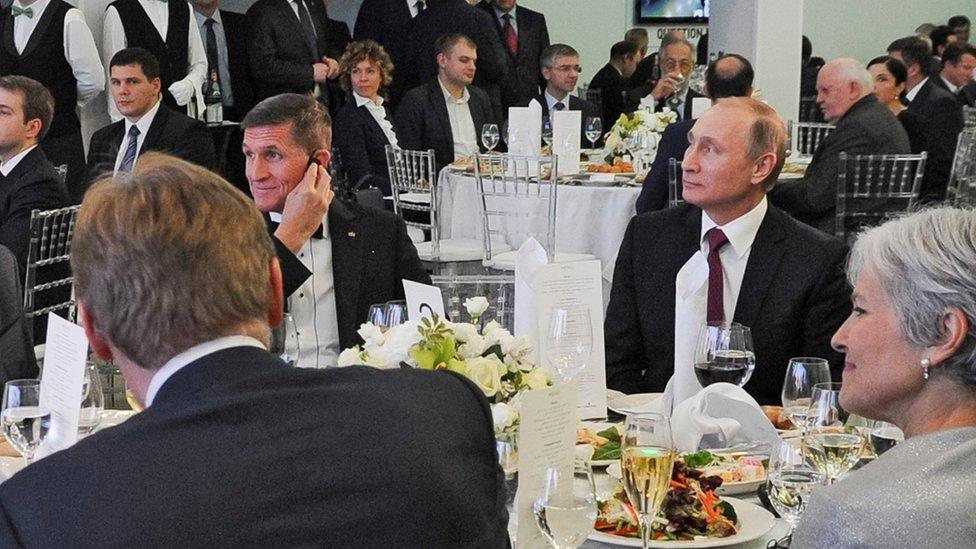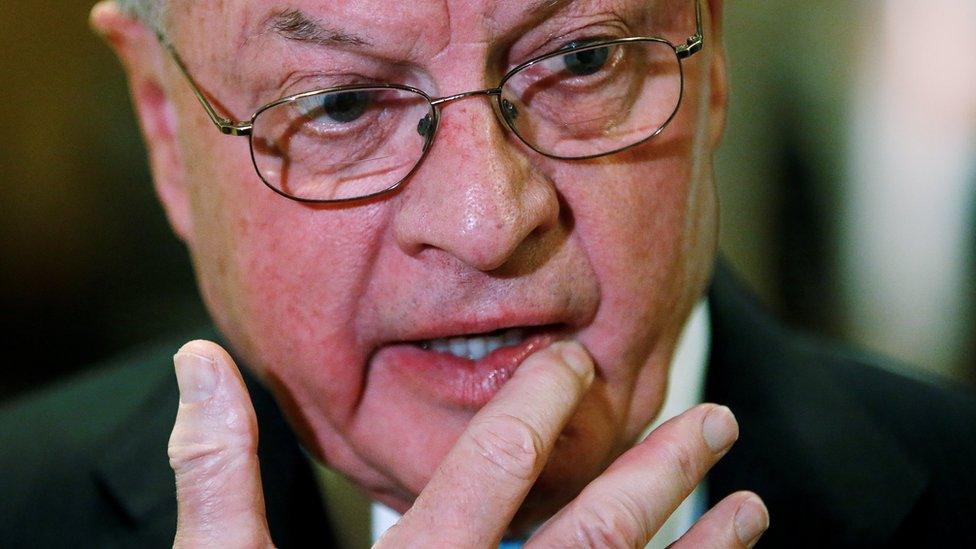Trump knew of Flynn Russia phone call issues weeks ago
- Published
Is losing a top job in 24 days a record?
President Donald Trump knew weeks ago there were problems with Michael Flynn's Russia phone calls, a White House spokesman has said.
The president was told by the Justice Department at the end of January that Mr Flynn may have misled US officials and the public, said Sean Spicer.
He was asked to quit three weeks later due to an "erosion of trust".
Republicans have joined congressional calls for an investigation into Mr Flynn's contacts with Russia.
Mr Flynn was also reportedly questioned by FBI agents in his first days as national security adviser, according to US media.
On a busy day for the Trump administration:
The US Office of Government Ethics has called on the White House to investigate adviser Kellyanne Conway for plugging Ivanka Trump products
The New York Times reported, external that phone records and intercepted calls show that members of Mr Trump's presidential campaign, as well as other Trump associates, "had repeated contacts with senior Russian intelligence officials in the year before the election"
The chairman of the House standards committee wants to know more about security measures at Mr Trump's Florida retreat after photos were posted on Facebook of the president taking a call about North Korea
The president signed an executive order rolling back a regulation that required oil and gas companies to disclose certain foreign payments
What Mar-a-Lago photos show us
Call for ethics inquiry into Conway
Mr Flynn resigned over allegations he discussed US sanctions with a Russian envoy before Donald Trump took office.
The retired army lieutenant-general initially denied having discussed sanctions with Ambassador Sergei Kislyak, and Vice-President Mike Pence publicly denied the allegations on his behalf.
When exactly did Trump know?
If the allegations are true, it would have been illegal for Mr Flynn to conduct US diplomacy as a private citizen, before he was appointed as Mr Trump's national security adviser.
Acting Attorney General Sally Yates had warned the White House about the contacts and that Mr Flynn might be vulnerable to Russian blackmail on 26 January, said Mr Spicer.
White House press secretary Sean Spicer: "What this came down to, was a matter of trust"
Mr Trump, who was informed the same day, had concluded that his actions did not violate any law, according to Mr Spicer.
The White House counsel then conducted an extensive review and questioned Mr Flynn on multiple occasions before arriving at the same conclusion as Mr Trump, he added. But the trust had gone
"In the end, it was misleading the vice-president that made the situation unsustainable," White House Counsellor Kellyanne Conway said on Tuesday.

More on the Flynn scandal

Kellyanne Conway said Gen Flynn either "misled" or "could not completely recall" his conversation
How are Republicans reacting?
In his first public comments about the controversy, President Trump tweeted on Tuesday, external: "The real story here is why are there so many illegal leaks coming out of Washington? Will these leaks be happening as I deal on N Korea etc?"
Republican John McCain, chairman of the Senate armed services committee, said Mr Flynn's resignation was a "troubling indication of the dysfunction of the current national security apparatus" and raises questions about Mr Trump's intentions towards Russia.
Senator Roy Blunt, a Republican member of the Senate intelligence committee, called for an investigation into any alleged connections between Mr Trump and Russian officials.
Texas Senator John Cornyn, the second-ranked Senate Republican leader, echoed calls for an investigation into Mr Flynn's ties to Russia.
Meanwhile, US House Intelligence Committee Chairman Devin Nunes told reporters on Tuesday he wants to investigate the leaks that led to Mr Flynn's resignation.

What this says about Trump and Russia - Jon Sopel, North America editor
In one recent interview Trump seemed to suggest that America as a state had no greater moral authority than Russia. It was the doctrine of American Unexceptionalism if you like.
Michael Flynn had sat with the Russian President not that long ago at a dinner honouring the pro-government TV network Russia Today. Extraordinary that a former three-star US general would be there.
A dossier drawn up by a former MI6 officer - that was flatly denied - alleged all manner of Russian involvement in President Trump's businesses and presidential campaign.
The Trump base love what they've heard about the migrant ban, the eviction of illegal immigrants, the jobs pledges and a lot more besides.
What causes a lot of people to scratch their heads is why the love-in with Putin. What is the goal, where does this lead - but what is driving this? Even if the most lurid things in the dossier were untrue, are there other things that are? Does Putin have some kind of leverage over the new American President?

Kremlin spokesman Dmitry Peskov said Russia would not be commenting on the resignation.
"This is the internal affair of the Americans, the internal affair of the Trump administration," he added. "It's nothing to do with us."

Mr Flynn was pictured dining with Russian leader Vladimir Putin in December 2015
What happens next?
Senior Democrat Adam Schiff said Mr Flynn's departure would not end questions about contacts between Donald Trump's campaign and Russia.
Congressional democrats John Conyers and Elijah Cummings have demanded a classified briefing to Congress on Michael Flynn by the justice department and FBI.
"We in Congress need to know who authorised his actions, permitted them, and continued to let him have access to our most sensitive national security information despite knowing these risks," their statement said.
Several House Democrats had already called on Oversight Committee Chairman Jason Chaffetz to launch an investigation into Mr Flynn's ties to Russia.
Who will replace him?

Retired Lieutenant General Keith Kellogg has more than 30 years' experience in the army
While Mr Kellogg has been appointed acting national security adviser, former CIA director David Petraeus and Robert Harward, a former deputy commander of US Central Command, are also under consideration for the post, White House officials say.
